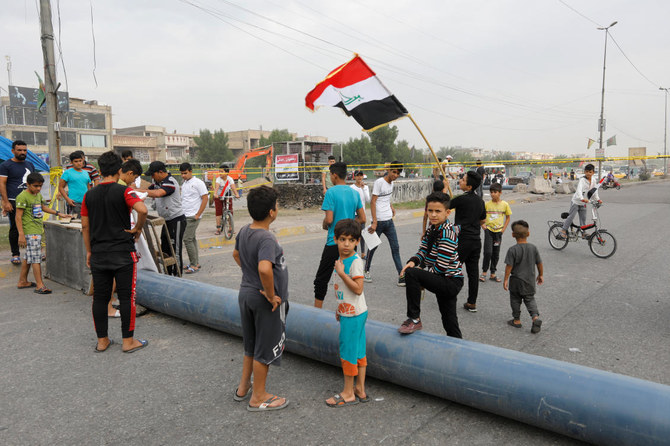BAGHDAD: Protests threatening the oil industry and blocking access to Iraq’s ports have cost the country “billions,” Prime Minister Adel Abdul-Mahdi said on Sunday.
The embattled leader issued a long statement in response to weeks of demonstrations against the government that have been met with a brutal response from the security forces, killing more than 250 people.
Abdul-Mahdi said the protests have delayed the arrival of goods and this has contributed to an increase in prices paid by citizens, the poor in particular.
He also said demonstrations have affected the growth of the economy and delayed the submission of the budget for 2020.
Last week, President Barham Salih said Abdul-Mahdi is willing to resign amid the crisis once political leaders agree on a replacement.
But the prime minister made no mention of standing down, instead focussing on the economic damage of the protests.
He said the Baghdad International Fair was delayed because of the demonstrations, and that sick people’s lives have been put at risk because medical clinics have been forced to close and ambulances obstructed.
He called on anti-government protesters to reopen roads saying “it’s time for life to return to normal.”
The prime minister differentiated between peaceful protesters, who he said had turned the demonstrations into “popular festivals” that bring the nation together, and “saboteurs” who had used the demonstrators as “human shields” while attacking security forces.
He also called for markets, factories, schools and universities to reopen after days of protests in the capital and across the mostly Shiite south.
Tens of thousands of protesters have gathered in Baghdad’s central Tahrir Square and across southern Iraq in recent days, calling for the overhaul of the political system established after the 2003 US-led invasion.
Protesters have also taken over a large tower in the square that was abandoned after it was damaged in the war.
Thousands of students have skipped classes to take part in the street rallies, blaming the political elite for widespread corruption, high unemployment and poor public services.
Earlier Sunday, protesters blocked roads around their main protest site with burning tires and barbed wire, unfurling a banner at one roadblock reading: “Roads closed by order of the people.”
They appeared to be borrowing a tactic from Lebanon, where similar anti-government demonstrations have been underway since Oct. 17, and have repeatedly blocked major roads in order to ramp up pressure on authorities.
(With AP)


























